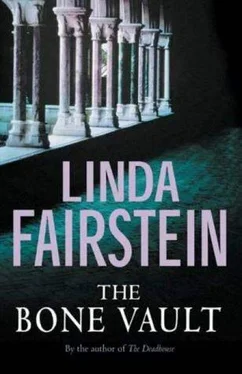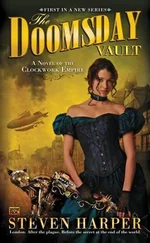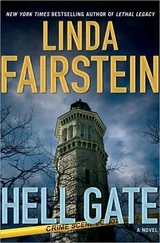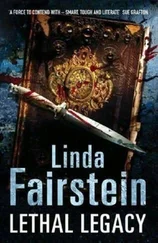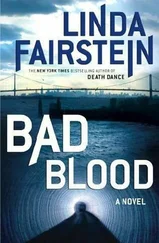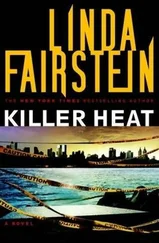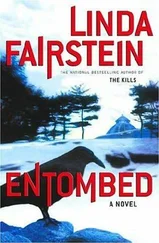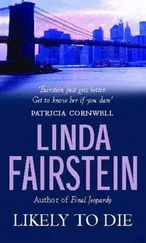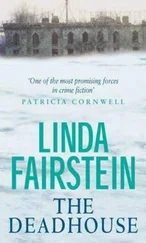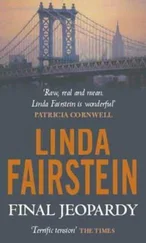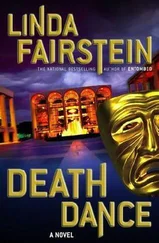“This isn’t the only shop?” Mike’s question conjured up the image of endless small cubbyholes within the massive storage areas. Pierre Thibodaux’s point about several million objects of art below the museum’s surface was becoming very real to both of us.
“Oh, no. Must be at least a dozen more like this scattered about within the building, as well as space we rent outside.”
“Anybody else getting hot flashes?” Mike pulled out his handkerchief and wiped his brow.
Anna laughed. “All of these fragile works of art have different needs. Those sculptures that survived in the deserts for centuries like it hot and dry inside. My department-things from the South Pacific islands and the ocean people-thrive in a damp environment. There are climate controls all over the museum-thousands of sensors. You can go to all extremes of temperature, hot or cold, damp or dry, just by moving from gallery to gallery.”
“And you can tell me what the weather is in every section, more reliable than those schmucks I listen to every night on TV?”
“We certainly can,” Anna said, “because we manufacture our own weather conditions.”
I knew Mike was trying to figure out where within a museum Katrina Grooten’s body could have been best kept without decomposing. Would her killer have known how these temperatures and conditions would affect a human body? Or would it have proved to be a circumstance that accidentally worked against his interest, preserving the remains so that they were recognized and identified before leaving the country?
“You’re welcome to come back here any time to go through all of these storerooms, Detective,” Poste said, locking up behind us. “I think you’ll need an army to help you do it.”
“You got a list of all your employees, Maury?” Chapman asked Lissen as we reentered the hallway. “Names, dates of birth, social security numbers?”
“Yeah, Eve was going to print it out for you. They’re all bonded. Won’t find any criminals in my department. The thieves all work upstairs in archaeology and anthropology, if you ask me, robbing the graves and stealing these pots and pans from other countries.” Lissen wasn’t the first one to complain about the ethics involved in museum acquisitions.
“Other workmen?”
“You got a sea of ‘em down here. They got offices in the subbasement for locksmiths, plumbers, electricians. They roam around this place like it was the wide open spaces.”
We turned another corner and reached a divide between sections of the corridor. The lights dimmed even more and the ceiling dipped to a mere eight feet. Poste and Friedrichs led us across a low barrel vault, which ran north to south through the center of the building, deep below the museum, and brought us out on its other side.
Mike had stopped in the middle and called out to us, “What’s in here?”
“One of the original structural features of the museum,” Poste said. “It’s long been obsolete.”
“Let’s have a look.”
We all turned back to join Mike.
“This was constructed in the middle of the nineteenth century,” Anna said. “An enormous storm drain-off for the Central Park reservoir.”
We walked ten or fifteen feet into its mouth, and the temperature dropped noticeably. There were ghostly figures of bronze bacchanals and carved Asian dragons, heavy pieces of furniture and fluted columns. Most of these neglected or unwanted artworks had been dressed in plastic shrouds and left to guard this useless tunnel.
Mike used the point of his pen to lift the covers and poke around the objects.
“Even art goes in and out of vogue, Mr. Chapman. Something that was all the rage for collectors a century ago gets cycled out. Some of the greats have staying power, but-”
“Anything Egyptian in here, Mr. Poste?”
“I’d be surprised if there isn’t. We can light this for you more properly when you come back. There are a couple of areas like this which just aren’t the first priority to be fixed up with our limited funding.”
Our walking tour continued until we had circumnavigated the entire museum basement, peering into storerooms and skirting empty corners. Erik Poste wasn’t wrong; it would pay to come back here with reinforcements in serious numbers. Perhaps we could convince the chief of detectives to let us have some cadets from the Academy to scour the vast space for us.
We left our three escorts near the front door, where a uniformed guard was waiting to let us out. The museum had closed at five-fifteen, and it was just after seven in the evening.
Even though it was dusk, the Fifth Avenue steps remained a place for groups of all sorts to congregate. Three rappers were doing moonwalks at the bottom of the staircase, a juggler was trying to keep six balls in the air while playing the harmonica, and a bespectacled kid was reading aloud fromUlysses to the accompaniment of her friend’s guitar.
We stayed to the far south and descended the three tiers. “You think you could actually kill someone in that museum?” I asked.
“I’ll let Dr. K. figure that one out. You could sure as hell stick her there to rest for a few months without any interruption, except by chance. Or probably even have the coffin moved in and out, without anybody being the wiser. I never gave any thought to how big that place is. Kind of like an iceberg below the main display floors.”
“Millions of objects that never see the light of day.” I pulled my cell phone from my handbag and dialed Nina’s hotel, leaving her a voice mail about where to meet us for dinner.
Mike and I were the first to arrive at the restaurant on Second Avenue near Sixty-fourth Street.
“Buona sera,Signorina Cooper. You going to be four tonight?”
“Yes, Giuliano. Do you mind if we borrow your office for a few minutes?”
He laughed and told Adolfo to unlock the door at the foot of the staircase. Mike and I went down and turned on the small television set, switching the channel to find Alex Trebek. One of our common bonds was a devotion to the Final Jeopardy! question at the end of the daily quiz show. For the decade throughout which we had worked together, Mike had found a way at almost every crime scene or station house to get to the tube in time for the last question, to bet on it against me and against Mercer.
“Tonight’s category, ladies and gentlemen, is ‘The Cinema,’” Trebek said, stepping back to reveal a giant screen with those two words printed on it.
There were some topics I didn’t challenge Chapman on, and others that were completely my domain. This was one we both knew and loved.
“Twenty dollars.”
“Dinner, Coop. For four.”
“You’re on.”
“Tonight’s Final Jeopardy! answer is: William Shatner starred in this movie, filmed completely in the universal language Esperanto.”
The nauseatingly cheerful music bounced along in the background as two of the three puzzled contestants stared blankly at the board. The only one of them who ventured a guess at a title was wrong, and I told Chapman that I didn’t have the faintest idea. Before Trebek read the studio audience the question, Chapman tweaked the back of my neck. “And a good bottle of wine with that dinner, too. Right, blondie?”
I laughed and swatted his hand away. “Anything you say. Just let go of me.”
“What isIncubus? Nineteen sixty-five. A man possessed by demon spirits. Only Shatner outing worse than that one isBig Bad Mama, ” he said, shutting off the TV and walking out of the office, “where you actually get to see his pubic hair in one of the scenes. Chow time.”
“And you make it so appetizing, too.”
Fenton had our drinks ready at the bar, where Mercer had greeted Nina as they were waiting for us to come back upstairs.
Читать дальше
